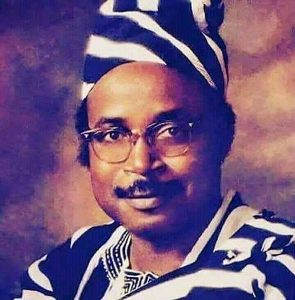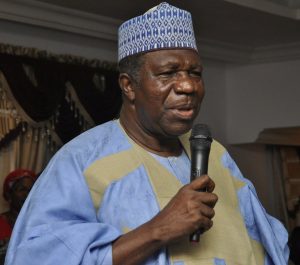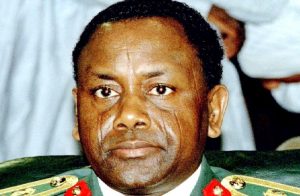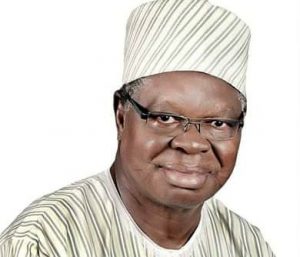Other than the minority status of the Idoma nationality in a nation of mega nationalities, he occupied the same status as the Adedibus, the Shehu Musa Yar’Aduas and the late Sola Saraki. The difference though is that he wasn’t a welfarist or a practitioner of any organised, humanistic consciousness. Even then, in no cultural, political or geographical setting would his death not enjoy the status of the end of an era. It cannot but be so for the person all 60 year old in virtually every part of Idomaland today grew up to hear his name. But unless one is seeking the wrath of the Och’Idoma of Idoma, Chief Obande Obeya is not dead. He has only gone hunting. But for the ‘lawlessness’ of the social media, nobody would hear of it till the next three or so years. The times are changing and hoping that the Och’Idoma does not read online platforms, Obande Obeya’s ‘trip’ to his ancestors can be the subject of an analytical reporting.
A very difficult task at that because it can be difficult deciding where to take his story from. Each angle is interesting enough. Take for instance, the fact that although he was not lettered, he won all his cases involving properties he asserted his ownership, including those he contested with successive governments of Benue State. The most notable must be what stands now as St Williams College, Otukpo. It used to be a General Hospital which the late Aper Aku administration in the Second Republic claimed as its. The late Chief Obande won his claim to it before turning it into the secondary school. Given how far the case went, he could not have achieved the feat if he were not a scrupulous documenter.

The late Aper Aku, first democratically elected governor of Benue State, 1979 to 1983

Senator Ameh Ebute, Chairman of the Senate Appropriation Committee in Second Republic
By the way, he was the Benue State Chairman of the National Party of Nigeria, (NPN) in the Second Republic. All the tough politicians, some of whom went to some of the best schools within and outside Nigeria, be it Senator Ameh Ebute, a lawyer and Chairman of the Senate Committee on Appropriation; Senator Godwin Okpeh, a former Commissioner for Finance and Economic Planning and perhaps Chief Audu Ogbeh, a member of the literary kindred, among others, never overshadowed him. There used to be a joke in Benue politics that, indeed, was a power behind the throne; that he was so influential in the Aku administration.
He absolutely had his ways in politics. He was unbeatable in terms of public relations. It is said that if the late Chief Obande took your problem to Makurdi, (where the authoritative allocation of values takes place), he was sure to come back with the answer, whether it is employment, promotion, wrongful termination or whatever. One way he approached it was public relations. He was sure to arrive Government House, Makurdi in such circumstances with the sort of bush meat that the size and quantum were sure to win over whomever he was seeing. He was sure to have come with plenty of them. The person to whom the gift is directed would be so overwhelmed that his request would be granted. It was not bribery. It is something English language probably has no lexicon yet.
In time, he emerged with the status of a go-getter and even a fighter. In matters of identifying and advancing the interest of his areas of interest, he merited that identity. There was no body he could not access. During the Abacha era, gist merchants said it was he who made Abacha make unbelievable concessions to the Idoma. In appreciation to Abacha for appointing the late Chief David Attah, their son, as his Chief Press Secretary, the Idoma elite led a delegation to the Villa to say a hefty ‘thank you’ to the late Commander-in-Chief. The visit to the seat of power went well but as it was time for everyone to take leave, Chief Obande indicated he still had something to say. According to some people who were there, everyone else except him had their hearts in their mouth. They feared he would say something that would annoy General Abacha, whether Abacha expressed the annoyance instantly or kept it to himself. However, the story is that it was his frank, ‘undiplomatic’ talk that made Abacha to not only send the then reigning Idoma monarch to London for medical treatment but also added him to the FG’s list of appointees to the 1995 Constitutional Conference. In the end, he made Abacha and everyone else happy.
If he believed in anything, he went for it. As such, he came up as a hard man but not an evil or bad person. But even if he were, it was such that no elite could do without him. There is no one in the Okpokwu Local Government Area that is anybody in politics who did not have to settle accounts with him. In fact, it is believed in some quarters that he was maneuvered into accepting Governor Samuel Ortom’s new set of chiefs to weigh him down and weaken him politically. Otherwise, should the dynamics work out in such a manner that he came out against anyone in politics, the fellow was bound to kiss the ground. The police would not or could not arrest him. By size, he had a commanding presence, intimidating of whichever DPO or local election officials. Above all, he feared no one. For fear of him spoiling things, almost every local politicians went to settle accounts. Account here did not mean giving him money but abiding by his latest negotiating position although he rarely had negotiating positions as such. His negotiating position was what he wanted and which politician or party would oblige. His interest depended on time and space.

Late Gen Sani Abacha, Head of State and Commander-in-Chief of the Nigerian Armed Forces from 1993 to 1998

Gen Geoffrey Ejiga, Idoma senior citizen
He never had a permanent interest or political party. He was simply a political player, perhaps in spite of himself. This is so because, as early as the late 1980s, he had signaled his interest in becoming the Och’Idoma of Idoma. Relativism was the issue for him. Most of the elite did not think that was possible but he went far or almost made it. Intervention stands to be corrected but among those he contested with were Chief Edwin Ogbu, a former Super Permanent Secretary in Gowon’s time and later, a UN diplomat. Ordinarily, the gap between the two was so wide, more so that Edwin Ogbu was basically invited as a consensus candidate of the elite.
Even when no one gave him any chance, he turned the contest upside down. The Military Administrator at the time and his cabinet had to come up with a funny qualifying criterion of WASC so as to eliminate him from the contest for the job. He turned up with one. The criteria were adjusted to include a university diploma. Again, he turned up with one. Then they asked him to name some of his school mates in the university he attended. This was when he told his examiners not to make him cry from thinking of them because they were all dead. Laughter and wonderment at his imaginative radius combined to unmake all his examiners. That was the point at which the government now introduced a written examination for the office, just to get him out. They got him there. Theoretically, he was qualified because he is full blooded Idoma. Otherwise, he was not seen as an Och’Idoma. But he could not be easily pushed away. Whatever exaggerations in some of these narratives of him, they are substantially correct.
At a point after his encounter with General Abacha, some people began to interrogate the wisdom of trying to bar him from the Och’Idoma stool. Arguments surfaced in recognition of his ability to penetrate fortresses, his incredible native intelligence and his capacity for calculated or deft moves. By then a brand new Och’Idoma in the person of the incumbent Dr Ikoyi Obekpa was already on the throne. So, becoming the Ad’Enone (father of Western Idoma) – First Class Chief of Ado, Okpokwu and Ogbadibo, three out of the nine LGAs that make up Idomaland – was the highest he could attain. Imagine that he beat Senator Ameh Ebute and Senator Godwin Okpeh to get that!
Many would miss him. Those who would not miss him because they experienced the oppressive side of his dominance would still not forget in a hurry that he was around. It could not be so because he has been as constant as the Northern Star since the 1960s, from the rough and tumble of transport business in early Otukpo urban life, rising gradually to assert himself politically over the three LGAs mentioned earlier. It is never going to happen again that anyone would exercise that kind of unconstrained power. That is not to say local actors inclined to despotism do not exist. They do. But they are not in the mould of fancy car loving late Chief Obande Obeya, one man whose own education was from the University of Life but who built two secondary schools – Saint Williams College mentioned earlier and Obeya Memorial Secondary School, Okpoga from where many have gone to the university and far in life. Of course, he also had a football club.
There can only be an interim history of Chief Obande Obeya!




























